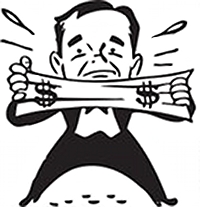It is well enough that people of the nation do not understand our banking and monetary system, for if they did, I believe there would be a revolution before tomorrow morning.
—Henry Ford
If you read part 1 of this series, and thought to yourself, hm, they didn’t account for inflation, congratulations. You’re right. It’s a pretty glaring omission, I know. Everyone knows you have to account for inflation.
I’m sure you know how this story ends, but let’s go ahead and go through the motions, anyway. If you recall, our contribution rate was $1200 per year, from ages 22 to 65. We found out last time that using the more accurate CAGR instead of “average” return, we wound up with a little over $600,000 instead of the $1 million we were promised. Now let’s factor in inflation. As it turns out, the inflation-adjusted CAGR of the stock market from 1900 through 2011 works out to just 6.26%. Heading over to the retirement calculator and plugging in our new 6.26% “real” return, we wind up with only $241,751. Ouch. So much for our million-dollar retirement.
No surprises, here, right? But there’s a problem. You see, this figure is pretty much bullshit as well. To understand why, we need to look into what inflation really is, and how it’s measured. [Click to continue…]






